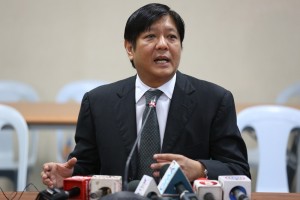Governors of South Cotabato, Palawan, Zamboanga del Sur and Davao del Sur provinces currently outside the Autonomous Region in Muslim Mindanao (ARMM) told a Senate hearing Wednesday they did not want to join the proposed Bangsamoro substate.
Davao del Sur Gov. Claude Bautista protested that the authorities in the provinces proposed to be included in the Bangsamoro entity had not even been consulted.
“We request that in order to pursue a lasting peace in Mindanao, the wish of those who do not want to join the proposed arrangement should be respected,” Bautista said in his remarks to the committee on local governments headed by Sen. Ferdinand Marcos Jr. conducting the hearing.
Bautista’s sentiment echoed those stated during the hearing by Governors Daisy Avance-Fuentes of South Cotabato, Jose Alvarez of Palawan and Antonio Cerilles of Zamboanga del Sur.
Substitute bill
After the five-hour hearing, Marcos stood on the floor and declared he could not support “in its present form” the Malacañang-sponsored Bangsamoro Basic Law (BBL) crafted in peace talks with the Moro Islamic Liberation Front (MILF).
“I have prepared a substitute measure that would be good for all,” said Marcos, chair of the Senate local government committee holding hearings on the proposed charter of the proposed Bangsamoro entity that would replace the ARMM.
Marcos said that the BBL “in its present form and substance will not bring us any closer to peace” but “lead us to perdition.”
He said that the Office of the Presidential Adviser on the Peace Process “totally ignored” some of the major stakeholders in their negotiations for peace, including the Moro National Liberation Front, the Sultanate of Sulu, the lumad, indigenous people, Christians and local government units.
Marcos later told reporters he would complete his committee report after a final hearing on the measure. Marcos said he would complete a committee report on the hearings after conducting one more BBL hearing.
He said his proposed alternative arrangement would be a “product of what we have learned in the hearings.”
Unconstitutional
The senator said his substitute bill would include the findings of Sen. Miriam Defensor-Santiago’s committee on constitutional amendments that certain provisions in the draft BBL were unconstitutional.
Marcos said that among others, the controversial “opt-in” provision that would expand the proposed Bangsamoro territory should be removed.
“I am confident that the committee report and the substitute bill will be completed during the recess period,” Marcos said, adding that he intended to give copies to all senators of the draft committee report and the substitute bill so that “we can hit the ground running” when Congress returns in July.
Marcos’ announcement of coming up with a substitute bill for BBL came just a week before Congress adjourns its session on June 11.
His announcement also meant that the Senate would not meet Malacañang’s June 11 target for the approval by Congress of the BBL in time for the election of the Bangsamoro parliament next year.
Cerilles said he was for peace but his province did not want to join the Bangsamoro region. Saying that his province was giving a “resounding no,” Alvarez said his constituents did not want to join as well. Fuentes objected to the province’s inclusion in the new region.
No consultations
“The framework of the BBL doesn’t even give us leeway to be consulted whether we want to be included in the BBL,” Bautista said.
Bautista also said he knew that Davao Occidental also did not want to be included in the core territory, something which Marcos confirmed was the sentiment given to him by Davao Occidental officials worried about the “opt-in” provision.
Expressing reservations on the draft BBL was the province of Tawi-Tawi while Isabela City in Basilan province said it did not want the BBL.
Also at the hearing, ARMM officials expressed support for the proposed BBL but some of them also raised some concerns on BBL provisions and made suggestions to improve the new political entity so there would be no repeat of the errors of the ARMM which the Palace had declared earlier to be a “failed experiment.”
ARMM Gov. Mujib Hataman, who took over the regional government in 2011, said that ARMM under the Aquino administration was better off now. He said that GDP increased to 3.6 percent from a negative .3 percent in 2011.
Investments in the ARMM also grew from P550 million in 2011 to P6 billion last year, according to Hataman. Investments have returned in the ARMM since the conflict stopped under the peace agreement with the MILF, he said.
RELATED STORIES
Marcos rejects BBL’s present form, says it will lead PH to perdition
Marcos: Senate to be more thorough, won’t railroad passage of BBL


